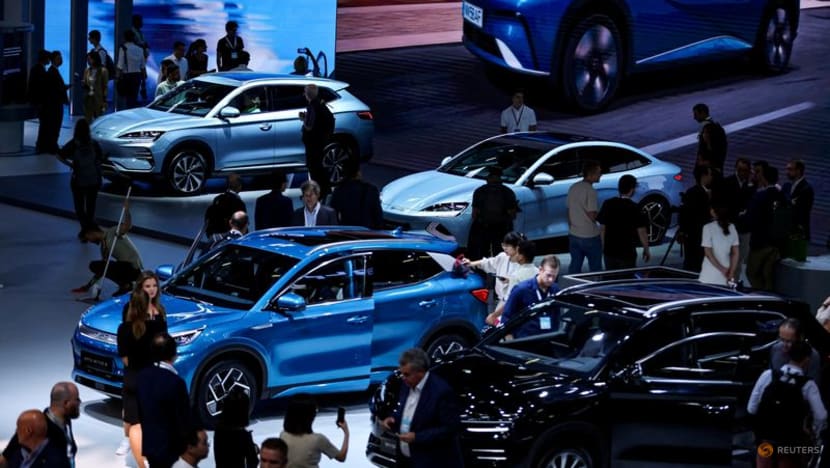Commentary: Europe navigates a precarious road on China EV tariffs
Higher levies on electric vehicles from China provide some breathing space for EU car manufacturers, but risk slowing the green transition, says Chris Bryant for Bloomberg Opinion.

BERLIN: Europe’s imposition of higher tariffs on Chinese electric vehicles (EVs) - the precise amount varies by automaker and in some cases is as high as 38 per cent - navigates a very precarious route between protecting domestic industry and provoking a full-blown trade war.
But the biggest losers are clear: European consumers and the green transition.
Increased duties will make Chinese shipments less profitable: Analysts at HBSC Global Research estimate Chinese EV makers currently have around a 30 per cent cost advantage. Hence, Chinese producers may not be able to lower prices as much as they would wish.
China has already cried foul and is likely to retaliate in some form, although the provisional duties may yet be revised lower. Currently, the EU imposes a 10 per cent levy on car imports, versus China’s 15 per cent.
In the long run, the decision could prompt Chinese companies to locate more factories in Europe - a trend that’s already well underway, and fretful European politicians can chalk up as a victory. But in the meantime there’s a risk the energy transition slows, when it urgently needs to accelerate.
SLOWDOWN OF EUROPEAN GREEN TRANSITION
When the European Commission began probing Chinese EV subsidies last year, I argued Europe should work on improving its own competitiveness and technological capability, rather than erecting new trade barriers. I wasn’t the only sceptic; one peculiar aspect of this trade fight has been the almost total absence of pressure from Europe’s car industry for greater protections.
This partly reflects Germany’s concern that China could respond by increasing import duties on its very profitable gas-guzzling limousines and SUVs. But even French carmakers, who don’t sell as many cars in China, often haven’t sounded terribly vexed.
The timing is certainly strange: Demand for EVs is softening in part because countries like Germany have slashed purchase subsidies. Automakers including Mercedes-Benz are rowing back on previously ambitious electrification targets, delaying battery factories and vowing to keep selling gasoline models well into the next decade.
If European automakers don’t want to sell EVs or can’t do so profitably, it’s bizarre to punish a country that can. The manufacturer now threatened with the highest tariffs - SAIC Motor - has been one of the most successful in attracting European buyers via its MG Motor brand.
NO THREAT TO EUROPEAN AUTOMAKERS?
While I’ve noticed a handful of BYD vehicles on the streets of Berlin, Chinese producers are a long way from obliterating local competition. Chinese-made vehicles account for around one-fifth of western European EV sales, but most of these are exported from China by Western automakers such as Tesla, Renault’s Dacia brand and BMW.
In contrast, purely Chinese brands accounted for less than 3 per cent of the total western European car market in the first four months of this year, according to Schmidt Automotive Research, and lately their advance has shown signs of slowing.
That’s partly because Chinese brands generally price their vehicles at higher levels than they do at home, possibly to avoid provoking Brussels. And while BYD, SAIC and their peers make technologically impressive vehicles, they still have a lot of work to do to build awareness and confidence among European car buyers. Chinese automakers “simply don't have the brand equity to compete with established OEMs (manufacturers) at this stage,” auto analyst Matthias Schmidt wrote on LinkedIn.
EUROPE SHOULD NOT GET TOO COMFORTABLE
Doing nothing wasn’t really an option for the Commission as the rules-based trading system is being widely ignored. There’s no question that China has heavily subsidised domestic producers, and the United States is now doing similar with the Inflation Reduction Act.
Washington’s decision last month to quadruple tariffs on Chinese EVs to 100 per cent has all but closed off a potential export market, increasing the risk that Chinese autos wash up elsewhere. French President Emmanuel Macron can’t afford to look soft on the Chinese threat, with parliamentary elections now looming and the far-right gaining ground.
Washington’s far more aggressive response is helpful in one respect: It makes Brussels’s approach appear comparatively moderate, and the Commission insists its response is “fully in line with relevant WTO (World Trade Organization) law.” While this might dissuade Beijing from excessive retaliation, I wouldn’t bet on it.
Increased tariffs provide Europe’s automakers with a bit more breathing space, but they shouldn’t get too comfortable. Chinese EVs are a new force to reckon with in global automaking. If domestic manufacturers fail to invest, innovate and cut costs, no amount of tariffs will save them.















